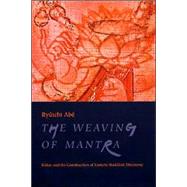The Weaving of Mantra
, by Abe, Ryuichi- ISBN: 9780231112871 | 0231112874
- Cover: Paperback
- Copyright: 10/1/2000
The great Buddhist priest Kūkai (774-835) is credited with the introduction and establishment of tantric -- or esoteric -- Buddhism in early ninth-century Japan. In The Weaving of Mantra,Ryūichi Abé examines this important religious figure -- neglected in modern academic literature -- and his profound influence on Japanese culture. Offering a radically new approach to the study of early religious history -- combining historical research, discourse analysis, literary criticism, and semiology -- Abé contends that the importance of Kūkai's transmission of esoteric Buddhism to Japan lay not in the foundation of a new sect but in his creation of a general theory of language grounded in the ritual speech of mantra.The Weaving of Mantraembeds Kūkai within the fabric of political and social life in ninth-century Japan and explains how esoteric Buddhism played a crucial role in many societal changes in Japan -- from the growth of monasteries into major feudal powers to the formation of the native phonetic alphabet, kana. As Abé illustrates, Kūkai's writings and the new type of discourse they spawned also marked Japan's transition from the ancient order to the medieval world, replacing Confucianism as the ideology of the state.Abé begins by placing Kūkai's life in the historical context of medieval Japan and the Ritsuryo state, then explores his interaction with the Nara Buddhist intelligentsia, which was seminal to the introduction of esoteric Buddhism. The author discusses Kūkai's magnum opus, Ten Abiding Stages on the Secret Mandalas( Himitsu mandara jujushinron) and introduces a number of Japanese and Chinese primary-source texts previously unknown by Western-language scholars. Instead of tracing Kūkai's thought through literal readings, The Weaving of Mantraexplores the rhetorical strategies Kūkai employed in his works, shedding valuable light on what his texts meant to his readers and what his goals were in creating a discourse that ultimately transformed Japanese culture.







